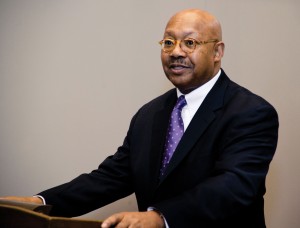
Alphonso Jackson (’68, ’69) speaks at a dedication ceremony in Pickler Memorial Library in February 2013.
Alphonso Jackson, alumnus and former member of the Truman State University Board of Governors, traveled back to Truman in February 2013 with his wife Marcia and daughter Leslie to donate a personal collection of artifacts he received while serving as the Secretary of Housing and Urban Development under President George W. Bush.
Jackson donated the personal collection to his alma mater, a place that holds so many special memories, including meeting his wife on the University campus.
Jackson graduated from the University with a bachelor’s degree in political science in 1968 and a master’s degree in education administration in 1969. He then went on to receive his juris doctorate from Washington University in 1973. Since earning his law degree, Jackson has compiled an extensive list of professional and personal accomplishments, including his service as the Secretary of Housing and Urban Development, and serving as the vice chairman of mortgage banking for JP Morgan. Jackson served on the Truman Board of Governors from 1994-2001.
Jackson spoke at the dedication ceremony held in Pickler Memorial Library, surrounded by a large collection of items he acquired while serving in the presidential cabinet. He expressed his appreciation and thanks to the University for helping him get where he is today.
“I’ve been very fortunate to be successful most of my life and still attribute that to coming out of this University. And along the way, I’ve been honored a great deal,” he said. “The highest honor that I’ve been given is to be Secretary of Housing and Urban Development under President Bush. During the process of being a member of the cabinet it is important to understand that everything you do during that period of your life is documented.”
Dozens of pictures, speeches and tokens, including an Air Force One blanket embroidered with the presidential seal, are now in the permanent possession of Pickler Memorial Library. Jackson and his wife donated almost three quarters of their collection, with the intent to eventually gift the collection in its entirety over the next several years. Items that have particular sentimental value remain in the family’s possession, including his personal cabinet chair and his cabinet portrait.
“All of [the collection] means a great deal to me because I am always amazed at what I have accomplished,” he said. “For the University to accept the donation from Mrs. Jackson and myself—I’m honored they would do that.”
Jackson hopes the exhibit will serve as a reminder to any Truman student of what they are capable of in their own lives, and to appreciate the community and education offered at Truman.
“I hope when people see the exhibit they will understand that they too can have an impact on what occurs in our country and be a participant in that process. That’s what I believe happened to me,” he said. “No one ascends to the top without the help of other people.”
Throughout his visit, Jackson continuously spoke of the great influence the University had on his life and attributed much of his success to the time he spent at the University and those who helped him along the way. His experiences on the University track team were especially meaningful as his relationship with Coach Kenneth Gardener proved to be one of the most impactful he would ever form.
Jackson described how easy it would have been to ignore his studies and focus on track, but Gardner pushed him to pursue and appreciate his education in such a way that he would eventually go on to earn his law degree.
“Kenneth Gardner was way before his time,” Jackson said. “Because when I came here to run track, he had a standard that was so high. You can remember that black athletes performed at predominantly white universities, but they didn’t graduate. Coach
Gardner said you are not going to perform for me unless you keep your grades up. And of the nine black athletes here, eight of us graduated on time. That was a very important thing that stayed in mind—how much he cared.”
When sharing his experiences with current students and advising them on their future plans, Jackson was quick to speak of his relationship with Gardner, and encouraged students to find a person who is willing to believe in and work with them the way Gardner did with him.
Another piece of advice Jackson gave to the students was to become participants in the political discussion. According to Jackson, the best way to do this is to vote, especially as young people, regardless of the party or candidate. In other conversations with the Truman community, he spoke very highly of the students who currently attend the University, joking that although he received degrees from the University in the 1960s, he wouldn’t be able to get into Truman now.
“It was very difficult to me to get where I’ve gotten, but the country that we live in is so wonderful and gave me the opportunities that I’ve had,” Jackson said. “I can’t tell you how proud I am to be back here and nothing is better than coming back home.”
Photos from the collection can be found here.

